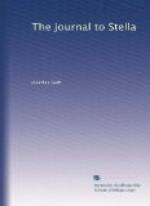6 See Letter 17, note 23. Mr. Bussiere, of Suffolk Street, had been called in directly after the outrage, but Radcliffe would not consult him.
7 The letter from Dr. King dated March 17, 1711, commenting on Guiscard’s attack upon Harley.
8 See Feb. 10, 1710-11.
9 The word “trangram” or “tangram” ordinarily means a toy or gimcrack, or trumpery article. Cf. Wycherley (Plain Dealer, iii. 1), “But go, thou trangram, and carry back those trangrams which thou hast stolen or purloined.” Apparently “trangum” here means a tally.
10 See Letter 12, note 2.
11 Swift means Godolphin, the late Lord Treasurer.
12 Sir John Holland (see Letter 3, note 28).
13 “It caused a violent daub on the paper, which still continues much discoloured in the original” (Deane Swift).
14 “He forgot here to say, ‘At night.’ See what goes before” (Deane Swift).
15 See Letter 17, note 1.
16 Irishman. “Teague” was a term of contempt for an Irishman.
17 To “Mr. Harley, wounded by Guiscard.” In this piece Prior said, “Britain with tears shall bathe thy glorious wound,” a wound which could not have been inflicted by any but a stranger to our land.
18 Sir Thomas Mansel married Martha, daughter and heiress of Francis Millington, a London merchant.
19 Slatterning, consuming carelessly.
20 “The candle grease mentioned before, which soaked through, deformed this part of the paper on the second page” (Deane Swift).
21 Harcourt.
22 William Rollinson, formerly a wine merchant, settled afterwards in Oxfordshire, where he died at a great age. He was a friend of Pope, Bolingbroke, and Gay.
23 In relation to the banknote (see Letter 17, note 14).
24 “Swift was, at this time, their great support and champion” (Deane Swift).
25 See Letter 14, note 15.
26 See Letter 17, note 25.
27 “Stella, with all her wit and good sense, spelled very ill; and Dr. Swift insisted greatly upon women spelling well” (Deane Swift).
28 “The slope of the letters in the words this way, this way, is to the left hand, but the slope of the words that way, that way, is to the right hand” (Deane Swift).
29 See Letter 17, note 24.
30 See Letter 5, note 11 and Letter 10, note 28.
Letter 20.
1 By the Act 9 Anne, cap. 23, the number of hackney coaches was increased to 800, and it was provided that they were to go a mile and a half for one shilling, two miles for one shilling and sixpence, and so on.
2 See Letter 11, note 39.




